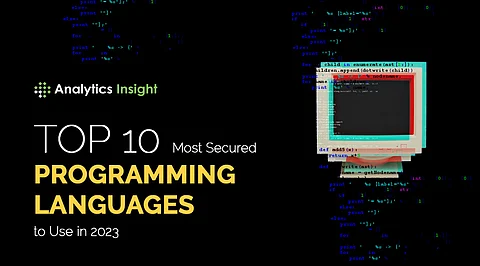

We all know that behind every developer is a beloved and often contentious programming language. In heated debates over which are the best and most secure programming languages and the security card usually becomes the prime factor in play in support of one language or to discredit another. Here again, we will address this debate of the most secured programming languages to use in 2023. Many developers and researchers think that there are limited secured programming languages and compare them to whether they are more or less secure than another. But the truth is that there are many factors that go into choosing some top programming languages, and it's up to you to make sure, when you use it, that you are doing everything that can ensure your software project's security. To help you in this, the article presents the top 10 most secured programming languages to use in 2023.
Ruby comes top in the list of most secured programming languages. It is a general-purpose high-level language created and developed by Yukihiro Matsumoto in Japan. It has now grown to be one of the most widely used programming languages worldwide. Numerous websites, such as Airbnb, Hulu, Kickstarter, and Github, have made extensive use of Ruby. Because it maintains a lot of a machine's complicated information, Ruby is one of the greatest programming languages for cybersecurity. This makes applications easier to design and requires less code.
HTML is important since virtually every other website makes use of it. It is a markup language and of all programming languages, it is the most crucial. HTML is the awkward step before learning to walk. 90.7% of the numerous websites in the present tech sector use this programming language.
PHP is everything you need to know if you're looking for a job that involves securing websites. It studies the data flow of a web application from input parameters to cautious strategies. RIPS can be used by PHP programmers who work on security-related issues. A server-side web app logic will be written by a PHP security-focused developer.
Shell scripting enables programmers to create automated scripts for a variety of repetitive tasks by using many of the same commands that you may currently use in your operating system's terminal sessions. Do you require prompt account provisioning with ample access? Do you need a system configuration security lockdown automated right away? Shell scripting is useful in this situation. If you use Linux or macOS, you should learn some scripting languages like Bash. Immerse yourself in PowerShell if you are a Windows expert.
Almost every website breach involving the theft of user's personal information that makes the news involves hackers getting access to a database, frequently through some form of SQL injection. Understanding SQL queries, their impact, and what they are intended to achieve will help cybersecurity professionals better comprehend the threat posed by a poorly protected database.
When users visit the website, designers can use any code thanks to JavaScript. This improves the website's primary functionality. Contrary to what would be anticipated, it might result in adversarial utility provided by the visitor. If the hacker takes over the website, they can use malicious software to launch a program. A thorough understanding of JavaScript will help you comprehend how the language has evolved over time in the cybersecurity industry.
Java is a popular programming language, created in 1995. It is a high-level, class-based, object-oriented programming language that is designed to have as few implementation dependencies as possible. It is used to develop desktop and mobile applications, big data processing, and embedded systems because of its secure nature.
It may be one of the most popular programming languages of all time. Reverse engineering and opening detection work best with C. Since it is simple to use and understand, this programming language has been in use since roughly 1970 and is still widely used. C gives programmers the ability to write low-level code. Experts in security awareness will make sure the site is impenetrable. Contrary to popular belief, programmers will use C to look for gaps in the site's security.
Python gives software professionals the ability to automate tasks and control malware research. Additionally, a sizable third-party library chock full of scripts is readily available. A SOC support expert is one of the employment role if you are familiar with Python. You will create tools and scripts in this role to protect the website from cyber-attacks. Data, logs, and artifacts can also be used to analyze the causes of problems.
C++ is the next edition of C. Like C, this programming language is outdated. Since C and C++ are related, most employers favor candidates who have a solid grasp of both of these programming languages. A C++ developer creates desktop and mobile applications, and programmers are trained to spot and fix problems and exposure examples. The ability to program in this language is essential for developing a career in cybersecurity.
Join our WhatsApp Channel to get the latest news, exclusives and videos on WhatsApp
_____________
Disclaimer: Analytics Insight does not provide financial advice or guidance. Also note that the cryptocurrencies mentioned/listed on the website could potentially be scams, i.e. designed to induce you to invest financial resources that may be lost forever and not be recoverable once investments are made. You are responsible for conducting your own research (DYOR) before making any investments. Read more here.
